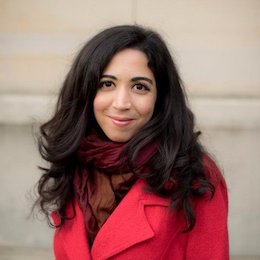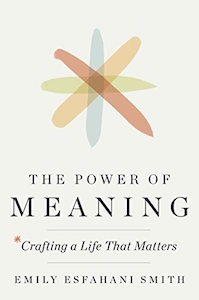What Are the Building Blocks of a Meaningful Life?
By Jenara Nerenberg
A conversation with Emily Esfahani Smith about the relationship between happiness, meaning, and modern life.
 Emily Esfahani Smith
Emily Esfahani Smith
A conversation with Emily Esfahani Smith about the relationship between happiness, meaning, and modern life.
Happiness isn’t the only kind of fulfillment that we are yearning for these days. As many of us live ever-more isolated from family and neighbors, no longer deeply connected to religion, what we long for is a sense of meaning and community.
Journalist Emily Esfahani Smith is the author of the new book The Power of Meaning: Crafting a Life That Matters, which explores the difference between a deep sense of meaning and a momentary sense of happiness. Ultimately, Smith arrived at four pillars of living a meaningful life: belonging, purpose, transcendence, and storytelling.
But Smith’s curiosity about the good life began even earlier, with her experiences growing up in a Sufi community. As you might expect, her book tries to combine ancient wisdom and modern scientific research. I talked with Smith about how the two intersect, and how the surprising and cutting-edge findings she came across can help us live more meaningful lives.
 Emily Esfahani Smith
Emily Esfahani Smith
Jenara Nerenberg: How does the modern research you detailed in your book relate to ancient wisdom about happiness and meaning?
Emily Esfahani Smith: I turned to the scientific research and social sciences to see what they had to say about the building blocks of a meaningful life, but I also looked at ancient wisdom as found in religion and philosophy. I tried to see what those sources had to say about what makes life meaningful and I found that there was a lot of overlap between what the science said and what these ancient sources of wisdom said.
Aristotle distinguished between the happy life and the meaningful life, and he talked about the meaningful life as an active life where you are contributing to others and playing a role in society and actualizing the potential that’s inside of you, which is also a well-researched finding today.
Immanuel Kant also wrote a great deal about the importance of contributing your talent to the world and that, if you have certain strengths, you have this duty to give them to the world.
And in psychology there’s a body of research that’s emerged around character strengths; those strengths help people feel like their lives are more meaningful and are a way for them to contribute what’s inside of them to the world.
JN: How did your Sufi upbringing inform your own journey and the foundation of this book?
ES: I grew up in a Sufi meeting house and was surrounded by people from a young age whose lives were very meaningful and who had clear answers to how to live a meaningful life and also what is the meaning of life. So that really left an impression on me, and it made me think from a young age about this concept of a life lived deeply: this concept of a rich life, a feeling of satisfaction due to committing yourself to something that’s bigger than you are.
In the case of Sufis, they think of their spiritual journey as this path that leads them to a connection to a higher reality. They meditate to bring themselves in contact with that higher reality [a form of “transcendence”]. They practice loving-kindness because their love of God includes the love of God’s creation and every human being in it.
So these people had a loving spirit, a strong sense of community, and I know that left a strong impression on me. And, as I mentioned, when I started out writing this book, I wanted to understand the building blocks of a meaningful life. One of the sources I turned to in understanding that was religion, because religion has been one of the most important sources of meaning for the majority of people for thousands of years.
JN: How do you define transcendence?
ES: The word “transcend” means to rise above, so transcendent experiences are when we feel lifted above our ordinary waking consciousness, above the ordinary world itself and connected to something greater. It’s the moment where you’re putting a pause on yourself and everything around you to feel in touch with something bigger that’s all around you.
Some people experience transcendence in nature in the woods or at the Grand Canyon, feeling connected to what surrounds them. Other people experience transcendence through religious rituals like prayer or meditation. One person I interviewed for my book said he felt his sense of self completely dissolve while meditating, and all that was left was a deep sense of connection to everything around him.
So there’s a spectrum to these experiences.
JN: What was one of the most surprising pieces of research you came across when putting the book together?
ES: I think that one of the most surprising things is what a powerful source of meaning storytelling is for people. When I wrote the book, I really wanted to understand what exactly the building blocks of a meaningful life are—and I learned about belonging, purpose, transcendence, and storytelling.
The first three made sense to me and I had personal experiences with them that were meaningful, but storytelling was different, and it made me realize that we are all storytellers. We all have the ability to make a narrative out of our own lives. It gives us clarity on our own lives, how to understand ourselves, and gives us a framework that goes beyond the day-to-day and basically helps us make sense of our experiences. So the extensive role of storytelling was a surprise.
JN: What about future research—what’s on the horizon regarding living a meaningful life?
ES: Some of the new research coming out is about specific things people can do to make their lives feel more meaningful. There are well-known interventions related to happiness, such as gratitude journaling, and there’s a similar body of research forming around specific exercises you can do to make your life more meaningful. For example, just having habits and routine can make your life feel more meaningful. The research around transcendence is also growing.
